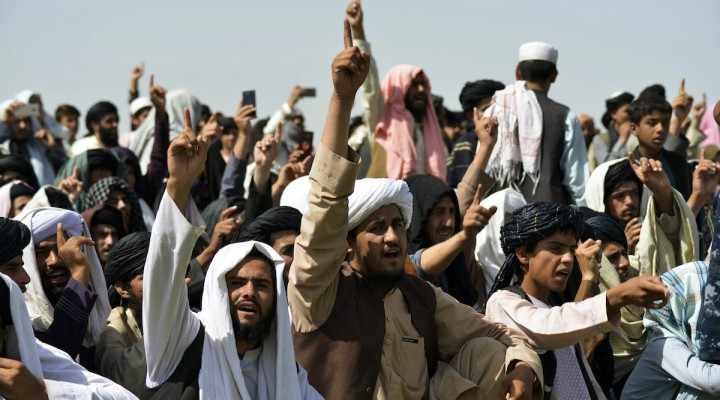Afghan chess pieces moving fast and furious

Iran leader Raisi claims Shiite mosque bombings in Afghan cities backed by US while China establishes a military base in next door Tajikistan
Afghanistan was the missing link in the complex chessboard of Eurasia integration. Now time is running out. After four long decades of war, getting the nation up and running as soon as possible is a pressing matter for all its neighbors.
The three key nodes of Eurasia integration are very much aware of the high stakes. Hence an all-out diplomacy drive from Russia, China and Iran to get the ball rolling.
A confab, officially named Second Meeting of Foreign Ministers – Afghanistan’s Neighbor Countries, was held on October 27 in Tehran uniting heavyweights China and Russia; Iran and Pakistan; and three Central Asian ‘stans: Tajikistan, Uzbekistan and Turkmenistan.
Call it a sort of extended replay of the recent Shanghai Cooperation Organization (SCO) summit – where they were all discussing Afghanistan in detail. Iranian Foreign Minister Hossein Amir-Abdollahian pointed to what everyone is aiming at. Peace, he tweeted, depends on an “inclusive government and respect for the will of the Afghan people.”
The joint statement once again revisited all the main themes: the necessity of a “broad-based political structure, with the participation of all ethno-political groups” in Afghanistan; the need for “non-interference in its internal affairs”; and an emphasis on “national sovereignty, political independence, unity and territorial integrity.”
And last but not least, the definitive red line, which is also an SCO red line: No support in any way, shape or form for any jihadi outfit.
The foreign ministers also re-emphasized what was already imprinted in the wide-ranging summit in Moscow: “Countries primarily responsible for the difficulties in Afghanistan should earnestly deliver on their commitment and provide Afghanistan with urgently needed economic, livelihood and humanitarian assistance to help realize a stable transition.”

The European Union has promised 1 billion euros in humanitarian assistance. So far, that’s just a promise. Washington has not sent any signs it might consider alleviating Kabul’s dire economic plight.
Nor has the Biden administration indicated it plans to release nearly US$9.5 billion in Afghan gold, investments and foreign currency reserves parked in the US that it froze after the Taliban’s takeover – despite rising pressure from humanitarian groups and others who say the punitive measure may cause the collapse of the Afghan economy.
Iranian President Ebrahim Raisi, after meeting with the foreign ministers of Pakistan, Tajikistan and Turkmenistan, went no holds barred. He had already alleged, on the record, that the US was facilitating the expansion of ISIS-K in Afghanistan – a fast-flip irony, if true, considering the terror group was responsible for killing 13 US military service members and scores of others in a late August bomb blast at Kabul’s international airport.
Then the Iranian leader doubled down, claiming that the recent sequence of terror bombings during Friday prayers in Shiite mosques in large Afghan cities has also been supported by the US.
Raisi is voicing, at a very high level, an analysis that intel services of several SCO member-nations have been actively exchanging: There’s only one major geopolitical player who benefits, divide-and-rule-style, from the chaos generated by ISIS-K.
The Russians, Iranians and Chinese are all paying close attention to all matters Afghanistan. Before his current European tour, Chinese Foreign Minister Wang Yi dropped by Doha on Monday for the first top-level China-Afghanistan meeting since the Saigon moment on August 15.
That also marked the return to the political stage of Mullah Baradar, the acting Afghan deputy prime minister, who seems anyway to be restricted to Doha political office business.
Wang once again made it very clear that it’s crucial to engage with the Taliban “in a rational and pragmatic manner” and emphasized, at the same time, that the Taliban should “demonstrate openness and tolerance.”
Beijing’s top priority is to start dealing with a functional government in Kabul as soon as possible. The integration of Afghanistan to the China-Pakistan Economic Corridor (CPEC), and also to the now fast-developing Iran-to-China corridor is a matter of urgency.

But all that pales in comparison with the challenges facing a still far-from-inclusive government: the looming economic crisis, the already de facto humanitarian nightmare, and the ISIS-K terror threat.
Only two days after Wang’s meeting in Doha, and nearly simultaneously with the meeting in Tehran, Tajikistan approved the setup of a Chinese military base in its territory. So here we go again.
 TheAltWorld
TheAltWorld 








0 thoughts on “Afghan chess pieces moving fast and furious”